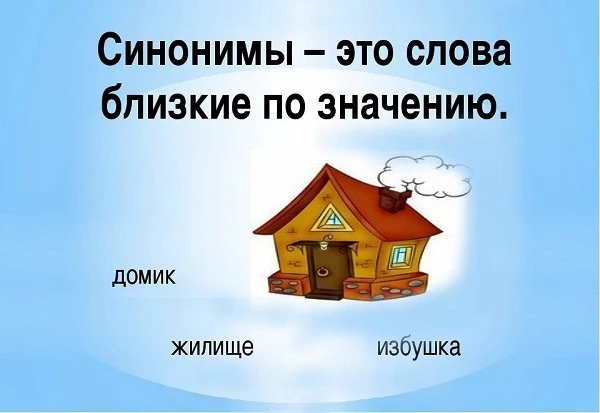Однако важно помнить, что не все слова с похожим значением являются полностью взаимозаменяемыми. Неправильное использование синонимов может изменить смысл фразы или даже всего текста. Поэтому при выборе слов необходимо учитывать контекст и общий смысл.
Использование синонимов делает текст более выразительным и помогает автору точнее передать свою мысль. Вместо повторения слова «красивый» можно использовать синонимы, такие как «прекрасный», «чудесный» или «восхитительный». Это добавит тексту яркости и эмоциональности.
Грамотное использование синонимов делает язык богаче и выразительнее, помогает избегать повторений и делает текст более увлекательным и понятным для читателя.

Что такое синонимы антонимы?
Синонимы и антонимы — это две группы слов, которые помогают нам выразить свои мысли более точно и живо.
Синонимы — это слова с похожим или близким значением. Их можно использовать взаимозаменяемо, не изменяя общий смысл текста. Например, слова «быстрый» и «скорый» означают одно и то же. Использование синонимов позволяет разнообразить речь и избегать повторений.
Антонимы — это слова с противоположным значением. Они позволяют создавать контраст и подчёркивать различия между противоположными идеями в тексте. Например, «быстрый» и «медленный» — это антонимы. Используя их, можно наглядно продемонстрировать отличия между двумя понятиями.
Важно понимать, что не все слова имеют синонимы или антонимы. Некоторые слова уникальны и не могут быть заменены другими. Также стоит учитывать, что одно и то же слово может иметь несколько синонимов или антонимов в зависимости от контекста.
Что такое синонимы глаголы?
Синонимы глаголов — это слова, которые имеют схожее значение и могут использоваться вместо друг друга, не меняя смысл предложения. Например, вместо глагола «идти» можно использовать такие синонимы, как «ходить», «шествовать», «проходить» или «двигаться».
Однако следует понимать, что синонимы могут иметь тонкие различия в значении. Например, слова «идти» и «шествовать» являются синонимами, но «шествовать» имеет оттенок торжественности. Поэтому при выборе синонимов важно учитывать контекст, чтобы не исказить смысл.
Использование синонимов глаголов помогает сделать текст более интересным и избежать монотонности. Вместо того чтобы повторять одно и то же слово, вы можете заменить его на другой глагол, чтобы сделать речь более живой и выразительной.
Что такое стилистические синонимы?
Стилистические синонимы — это слова, которые похожи по смыслу, но при этом подходят для определённого стиля речи или темы. Например, вместо глагола «говорить» можно использовать такие слова, как «рассказывать», «излагать», «изъясняться» или «декламировать». В зависимости от контекста и стиля речи, одно из этих слов может быть более уместным.
Стилистические синонимы могут отличаться по оттенку значения. Например, «рассказывать» и «декламировать» оба означают передачу информации, но «декламировать» подразумевает торжественное и публичное выступление. Поэтому важно выбирать подходящий синоним в зависимости от контекста, чтобы не исказить смысл текста.
Использование стилистических синонимов делает текст более живым и интересным, помогает передать нужное настроение и избежать однообразия. Это ключевой элемент в создании выразительного и захватывающего текста.
Что такое нейтральный синоним?
Нейтральный синоним — это слово, близкое по значению к другому слову, но не содержащее в себе эмоциональной или оценочной окраски. Например, слова «большой» и «крупный» являются нейтральными синонимами, поскольку они оба описывают размер, не добавляя никаких дополнительных оттенков смысла.
Использование нейтральных синонимов особенно полезно, когда нужно описать что-то без оценок и эмоций. Это часто требуется в научных статьях или юридических документах, где важна точность и объективность.
Однако, как и в случае с любыми синонимами, важно тщательно подбирать слова, чтобы не исказить смысл текста. Контекст всегда играет решающую роль. Например, в научных работах или официальных документах слово «крупный» может быть более уместным, чем «огромный», поскольку оно не вызывает эмоциональных реакций.
Использование нейтральных синонимов делает текст более точным и объективным, сохраняя при этом его ясность и доступность для чтения. Правильное применение таких слов делает ваше письмо или статью более профессиональными и понятными для широкого круга читателей.
Что такое прилагательные синонимы?
Прилагательные-синонимы — это слова, которые описывают предметы или явления, обладающие схожими характеристиками, но различающиеся по оттенкам или степени интенсивности значения. Например, слова «быстрый», «скорый» и «стремительный» используются для описания чего-либо, происходящего с высокой скоростью, однако каждое из них передаёт свой уникальный оттенок значения.
Использование синонимов-прилагательных позволяет сделать текст более разнообразным, избежать повторов и точнее выразить свои мысли. Например, вместо многократного повторения слова «быстрый» можно использовать слова «скорый» или «стремительный», в зависимости от контекста. Это сделает текст более живым и интересным для читателя.
Умелое использование синонимов-прилагательных делает текст более насыщенным и ярким, благодаря чему он легко воспринимается и запоминается.
Что такое лексические синонимы?
Лексические синонимы — это слова, которые означают примерно одно и то же, но отличаются по звучанию и написанию. К примеру, слова «перестройка» и «реформа» описывают процесс изменений, но звучат они по-разному.
Использование таких синонимов делает текст более разнообразным и помогает точнее передать мысли. Вместо того чтобы постоянно повторять одно и то же слово, можно использовать разные синонимы, что сделает речь более живой и интересной.
Что такое синонимы омонимы?
Синонимы и омонимы — это два различных понятия в языке, каждое из которых играет свою роль.
- Синонимы — это слова с похожим или одинаковым значением. Они могут различаться по звучанию и написанию, но обозначают одно и то же. Например, «автомобиль» и «машина» — это синонимы, они означают одно и то же транспортное средство, но звучат по-разному.
- Омонимы — это слова, которые пишутся и произносятся одинаково, но имеют разные значения. Например, слово «банк» может обозначать как финансовое учреждение, так и сосуд для жидкости. Омонимы могут добавлять тексту интерес и создавать игру слов.
Таким образом, синонимы и омонимы являются важными элементами языка, которые позволяют нам более точно и разнообразно выражать свои мысли. Они делают текст более глубоким и интересным для читателя.
Что такое суффикс синоним?
Суффикс синоним — это суффикс, который выполняет похожую функцию, что и другой суффикс, но с небольшими отличиями в значении. Например, в русском языке есть два синонимичных суффикса: -ник и -щик. Они используются для образования слов, которые означают человека, выполняющего определённую работу. Например, слова «рабочий» и «работник» имеют похожие значения, но могут использоваться в разных контекстах и с разными оттенками смысла.
Примеры:
- Суффиксы -ист и -ец: «ученик» и «учащийся».
- Суффиксы -ка и -ица: «машина» и «машиница» (старое слово).
Такие суффиксы позволяют сделать нашу речь более разнообразной, обогащая словарный запас и придавая ему различные оттенки и стилистические особенности.
Что такое разговорный синоним?
Разговорные синонимы — это слова или выражения, которыми мы пользуемся в повседневной речи вместо более формальных или книжных вариантов. Например, вместо слова «прекрасный» мы можем сказать «классный», а вместо «здесь» — «тут». Оба слова имеют одинаковое значение, но «классный» и «тут» звучат более просто и естественно, как в обычной разговорной речи.
Важно помнить, что в разных регионах и диалектах разговорные синонимы могут различаться. Поэтому при выборе слов необходимо учитывать, кто ваша аудитория, и как лучше донести до неё свою мысль.
Использование разговорных синонимов делает текст живым и понятным для большого круга читателей. Они придают тексту дружественный характер и делают общение более естественным.
Что такое паронимы синонимы?
Паронимы и синонимы — это два различных вида слов, которые играют разные роли в языке.
Паронимы — это слова, которые звучат очень похоже, но имеют разные значения. Например, «боль» и «болт», «сова» и «совет». Из-за схожести в звучании их легко спутать, что может привести к недопониманию.
Синонимы — это слова, которые имеют схожее или одинаковое значение. Например, «красивый» и «прекрасный», «дом» и «здание».
Паронимы и синонимы — это разные языковые явления, связанные со значением и звучанием слов. Если в тексте встречаются паронимы, важно обратить внимание на контекст, чтобы понять их правильно. Синонимы же помогают сделать речь более богатой и выразительной.
Итак, знание и правильное использование паронимов и синонимов делает вашу речь более точной и яркой, помогая лучше донести мысли и избежать ошибок в общении.
Что такое идеографические синонимы?
Идеографические синонимы — это слова или выражения, которые обозначают одно и то же понятие, но различаются по своим нюансам и оттенкам значения. Они помогают точнее передать мысль, добавляя выразительности и разнообразия речи.
Например, слова «прекрасный» и «восхитительный» оба описывают красоту, но «восхитительный» звучит более эмоционально и впечатляюще. Или возьмем цвета: «желтый» и «голубой» — это идеографические синонимы для слова «цветной», каждый из них передает свой уникальный оттенок.
Использование идеографических синонимов позволяет сделать текст более живым и ярким. В зависимости от того, какой оттенок значения вы хотите передать, вы можете выбрать наиболее подходящее слово. Это важно как в художественных текстах, где каждая деталь имеет значение, так и в повседневной речи, чтобы сделать общение более выразительным.
Таким образом, идеографические синонимы — это инструмент для точного и красочного выражения мыслей, который помогает избежать однообразия и делает речь более богатой и интересной для восприятия.
 Блог сайта SAS инструментов Полезные статьи для оптимизация и продвижения сайтов, безопасность, SEO, нейросети.
Блог сайта SAS инструментов Полезные статьи для оптимизация и продвижения сайтов, безопасность, SEO, нейросети. 
